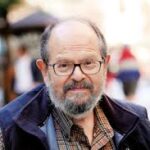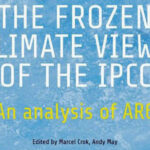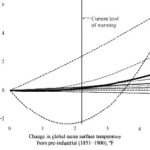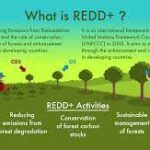Hieronder – beter laat dan nooit – het originele Engelstalige persbericht van de InterAcademy Council die het IPCC-onderzoek uitvoert onder leiding van Robbert Dijkgraaf. Hier de link naar een kritisch blog over het onderzoek van Kristin McMurray. Fred Singer, een “blogloze” scepticus van wie we al even niets gehoord hebben, schrijft in een e-mail: “als er niet een krachtige en erkende scepticus meedraait in dit panel (D’Aleo, Lindzen, McIntyre, etc.), zal hun rapport nog minder dan waardeloos worden…. er is eigenlijk weinig meer te verwachten dan een whitewash.
Date: March 10, 2010
FOR IMMEDIATE RELEASE
INTERACADEMY COUNCIL ASKED TO REVIEW INTERGOVERNMENTAL PANEL ON CLIMATE CHANGE
AMSTERDAM, Netherlands — The InterAcademy Council (IAC), a multinational organization of the world’s science academies, has been requested to conduct an independent review of the Intergovernmental Panel on Climate Change (IPCC) processes and procedures. The study comes at the invitation of the United Nations secretary-general and the chair of the IPCC, and will help guide the processes and procedures of the IPCC’s fifth report and future assessments of climate science.
(vervolg persbericht)
The IAC has been asked to establish an ad hoc Independent Evaluation Group (IEG) of experts from relevant fields to conduct the review and to present recommendations on possible revisions of IPCC practices and procedures. In addition, the IEG is asked to recommend measures and actions to strengthen the IPCC’s capacity to respond to future challenges and ensure the ongoing quality of its reports.
Founded in 2000, the IAC was created to mobilize top scientists and engineers around the world to provide evidence-based advice to international bodies such as the United Nations and World Bank — including preparing expert, peer-reviewed studies upon request. The IAC Board is composed of the presidents of 15 academies of science and equivalent organizations — representing Argentina, Australia, Brazil, China, France, Germany, India, Indonesia, Japan, South Africa, Turkey, the United Kingdom, and the United States, plus the African Academy of Sciences and the Academy of Sciences for the Developing World (TWAS) — and representatives of the InterAcademy Panel (IAP) of scientific academies, the International Council of Academies of Engineering and Technological Sciences (CAETS), and the InterAcademy Medical Panel (IAMP) of medical academies. The IAC Secretariat is hosted by the Royal Netherlands Academy of Arts and Sciences (KNAW) in Amsterdam. The IAC Board has final approval authority over conducting and publishing IAC studies.
The IAC is currently led by two co-chairs, Robbert Dijkgraaf, president of the Royal Netherlands Academy of Arts and Sciences, and Lu Yongxiang, president of the Chinese Academy of Sciences. Following IAC board approval of the review, the IAC co-chairs will appoint members of the IEG after a vetting process to assure their expertise, balance of perspectives, and absence of conflicts of interest. They will be volunteers who serve PRO BONO; only their travel and meeting expenses will be paid. Participants in the IEG will not be under obligation to any government, the IPCC, or the United Nations. The IAC and IEG will receive financial support for their work from the United Nations. Because work on the Fifth Assessment of IPCC has already commenced, the IEG has been asked to deliver its findings by Aug. 31, 2010.
Robbert Dijkgraaf said he was pleased to be representing the world’s scientists and science academies. “The InterAcademy Council,” he said, “is prepared to take on the challenge of this important review of the work and processes of the Intergovernmental Panel on Climate Change. Our goal will be to assure nations around the world that they will receive sound, definitive scientific advice on which governments and citizens alike can make informed decisions.”
Lu Yongxiang recalled that when the IPCC was created by the World Meteorological Organization and the United Nations Environment Programme in 1989, its charge was to provide scientific and comprehensive information about climate change. “With this review,” he said, “the IAC will carefully examine the IPCC’s procedures, processes, and types of products to ensure that climate change issues will be scientifically presented and solid science-based recommendations will be provided in future IPCC assessment reports.”
“I welcome Secretary-General Ban Ki-moon’s decision,” said Ralph J. Cicerone, IAC board member and president of the U.S. National Academy of Sciences, “to recruit experts from the world’s science community for this independent review of the IPCC, examining both its strengths and any areas where changes may be needed to produce the best possible assessments of climate science.”
Lord Martin Rees, IAC board member and president of the Royal Society, said, “Climate science is inherently complex, integrating many different disciplines and kinds of data. The IPCC’s role in assessing and expounding the latest scientific findings is getting ever more important. This independent review of its procedures is timely and important, as an aid to ensuring that future reports, which will assess new and updated research, are optimal resources for making sense of climate change and helping policymakers respond to it.”
Contacts:
Amsterdam: John Campbell, IAC Executive Director
Kloveniersburgwal 29
1011 JV Amsterdam
The Netherlands
E-mail: j.campbell@iac.knaw.nl
Press
Contact: William Kearney, Director of Media Relations
U.S. National Academy of Sciences
E-mail: wkearney@nas.edu
Phone: +1 202 334 2138
Web site: www.interacademycouncil.net\
# # #






…als er niet een krachtige en erkende scepticus meedraait in dit panel (D’Aleo, Lindzen, McIntyre, etc.), zal hun rapport nog minder dan waardeloos worden….
D'Aleo betrouwbaar?
Doe even leuk, lees even de uitglijder van hem samen met zijn (en jullie!) maatje Watts:
http://tamino.wordpress.com/2010/03/05/message-to…
Een ieder die D'Aleo en Watts nog serieus neemt, is zelf niet serieus te nemen.
En Fred Singer is ook niet serieus te nemen. Als Tabaklobbier heeft hij geen enkele geloofwaardigheid, wanneer wordt hij een keer voor het gerecht gedaagd voor het verkondigen van onwaarheden?
@JvdLaan: Dank voor je inhoudelijke reactie. Ik hoop dat je erkent dat het statement niet van mij was maar van Fred Singer. Die tabaksconnectie is bekend maar ik denk niet dat dit iets zegt over iemands latere werk m.b.t. klimaat. Anders zou iemand als Paul Ehrlich echt met pek en veren moeten worden weggehoond. Ik heb je link met de kritiek op Anthony Watts intern doorgestuurd en ik kom erop terug… laten we verder iha eens ophouden elkaar af te rekenen op wie wie noemt en wie wie kent… ga gewoon in op de inhoud. Heb je iets af te dingen op het statement dat het inderdaad wenselijk zou zijn als van het rijtje bekende topsceptici iemand panellid zou worden… en dan denk ik dus met name aan Christy, McIntyre of Lindzen…
Hajo, Ik houd ook niet van pek en veren, maar een aantal van deze personen heeft zich niet bepaald van hun beste kant laten zien. Laat de review gewoon door onbekende maar wel kundige wetenschappers worden uitgevoerd.
Maar wat de uitkomst zal zijn, dan zal er kritiek blijvem. Zou jij het accepteren als 99,9% gewoon onveranderd zou blijven (eerlijk zeggen!).
Ik begrijp je vraag niet.
a) ik heb helemaal niets te accepteren… hoogstens als journalist te becommentarieren.
b) bedoel je 99,9% van het IPCC rapport onveranderd zou blijven?
c) het IPCC rapport interesseert me eerlijk gezegd net zo min als de sprookjes van Grimm. met wat we weten is het IPCC echt "beyond hope"
d) ik vind klimaat nog steeds een van de boeiendste wetenschapsgebieden na de sterrenkunde en ik hoop op veel nieuwe inzichten in de rest van mijn levensspanne…
e) kritiek? er wordt zo veel geluld… waar het om gaat is wat er gebeurt…. en wat er gebeurt is dat de aarde in een grote spurt zit naar MEER welvaart dankzij MEER benutting van fossiele brandstoffen… (China, India etc.)
f) die laatste realiteit is de uitdaging voor de mondiale politiek (de VN speelt hoogstens een kleine en slechte bijrol)
g) de rest is wetenschap en die staat gelukkig los van het ipcc